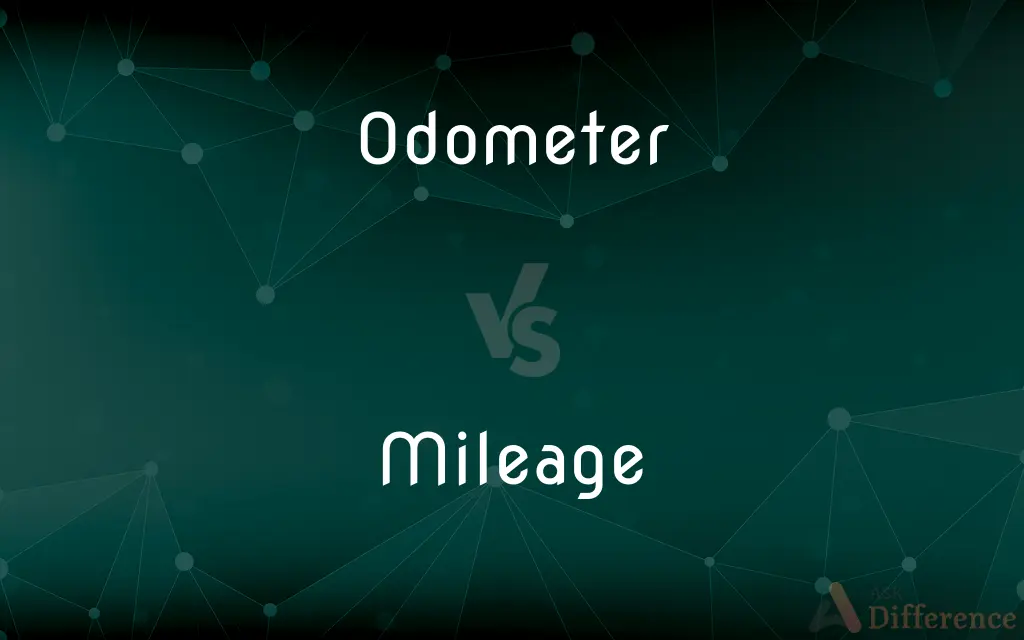Odometer vs. Mileage — What's the Difference?
Edited by Tayyaba Rehman — By Maham Liaqat — Updated on March 22, 2024
An odometer measures distance traveled, while mileage indicates distance per fuel unit.

Difference Between Odometer and Mileage
Table of Contents
ADVERTISEMENT
Key Differences
An odometer is a device found in vehicles that measures the total distance a vehicle has traveled since it was manufactured. This can be displayed as kilometers or miles, depending on the country. In contrast, mileage refers to the distance a vehicle can travel on a specific amount of fuel, expressed in miles per gallon (mpg) in the U.S. or kilometers per liter (km/L) in other countries. While the odometer provides a cumulative total of distance, mileage is a measure of fuel efficiency and how far a vehicle can go on a unit of fuel.
Odometers are integral to a vehicle's dashboard and play a crucial role in determining a vehicle's usage, wear and tear, and value. High odometer readings may indicate that a vehicle is well-traveled and potentially more worn. Mileage, however, is used to assess a vehicle's efficiency and can be a critical factor for buyers concerned with fuel costs and environmental impact. A vehicle with high mileage is considered more efficient and cost-effective to run.
The operation of an odometer is purely mechanical or electronic, recording the distance traveled regardless of the conditions or fuel consumption. On the other hand, calculating mileage involves a dynamic measurement that can vary based on driving habits, vehicle maintenance, and road conditions. This makes mileage a more variable and sometimes subjective metric, as it can change over time and with the vehicle's usage.
In terms of maintenance and resale value, the odometer reading is a key factor. A lower odometer reading generally suggests a less used vehicle, potentially leading to a higher resale value. Mileage figures, while important for operational costs, might be more relevant for immediate operational considerations rather than long-term value, though vehicles known for better mileage can also retain value better.
Understanding the difference between odometer readings and mileage is important for vehicle maintenance, resale, and operational cost estimation. The odometer gives a snapshot of the vehicle's life in terms of distance traveled, while mileage provides insight into the vehicle's efficiency and ongoing operational costs.
ADVERTISEMENT
Comparison Chart
Definition
Measures total distance traveled
Indicates distance traveled per unit of fuel
Purpose
To track vehicle usage and wear
To assess fuel efficiency
Display
Kilometers or miles on the dashboard
Miles per gallon (mpg) or kilometers per liter (km/L)
Impact on Value
Higher readings can decrease value
Higher efficiency can increase value
Variability
Constant, based on distance traveled
Can vary based on driving habits and conditions
Compare with Definitions
Odometer
A device in vehicles that records total distance traveled.
The car's odometer shows it has traveled 50,000 miles.
Mileage
A measure of how far a vehicle travels on a unit of fuel.
The new hybrid model boasts impressive mileage of 60 mpg.
Odometer
Integral for assessing vehicle usage and maintenance needs.
Regular service checks are recommended at certain odometer milestones.
Mileage
Can vary with driving habits and vehicle condition.
Aggressive driving can significantly lower a car's mileage.
Odometer
Can be mechanical or electronic in modern vehicles.
Electronic odometers are less prone to tampering compared to mechanical ones.
Mileage
Indicates fuel efficiency, affecting operational costs.
Drivers often prefer cars with good mileage to save on gas.
Odometer
Found on the vehicle's dashboard, displaying distance.
Before buying a used car, check the odometer for the total miles driven.
Mileage
Often used in vehicle specifications and advertising.
Auto manufacturers highlight mileage to appeal to eco-conscious buyers.
Odometer
A key factor in determining a vehicle's resale value.
Vehicles with lower odometer readings often command higher prices.
Mileage
An important consideration for long-term vehicle expenses.
Calculating monthly fuel costs requires knowing your car's average mileage.
Odometer
An odometer or odograph is an instrument used for measuring the distance traveled by a vehicle, such as a bicycle or car. The device may be electronic, mechanical, or a combination of the two (electromechanical).
Mileage
A number of miles travelled or covered
The car is in good condition, considering its mileage
Odometer
An instrument for measuring the distance travelled by a wheeled vehicle.
Mileage
Actual or potential benefit or use to be derived from a situation or event
He was getting a lot of mileage out of the mix-up
Odometer
An instrument that indicates distance traveled by a vehicle.
Mileage
Total length, extent, or distance measured or expressed in miles.
Odometer
An instrument, usually embedded within the speedometer of a vehicle, that measures the distance the vehicle has traveled since production.
Mileage
Total miles covered or traveled in a given time.
Odometer
A wheel used by surveyors, which registers distance traveled.
Mileage
The amount of service, use, or wear estimated by miles used or traveled
This tire will give very good mileage.
Odometer
An instrument attached to a vehicle or connected, as by a flexible cable, to the wheel of a vehicle, which measures the distance traversed.
Mileage
The number of miles traveled by a motor vehicle on a given quantity of fuel.
Odometer
A hodometer.
Mileage
An allowance for travel expenses established at a specified rate per mile.
Odometer
A meter that shows mileage traversed
Mileage
Expense per mile, as for the use of a car.
Mileage
(Informal) The amount of service something has yielded or may yield in the future; usefulness
A tape player that still has a lot of mileage left.
Mileage
The total distance travelled in miles or in air miles.
Mileage
The number of miles travelled by a vehicle on a certain volume of fuel.
Mileage
An allowance for travel expenses at a specified rate per mile.
Mileage
(informal) The amount of service that something has yielded or may yield in future.
This old PC has still got plenty of mileage in it.
There’s quite a lot of mileage in language, speech and computing, particularly in research.
Mileage
(informal) Something worth taking into consideration.
There’s some mileage in your argument.
Mileage
An allowance for traveling expenses at a certain rate per mile.
Mileage
Aggregate length or distance in miles; esp., the sum of lengths of tracks or wires of a railroad company, telegraph company, etc.
Mileage
The number of miles that a vehicle can travel after consuming a certain quantity of fuel; in the United States, usually expressed in units of miles per gallon; as, smaller cars tend to get better mileage. It is sometimes used as a nmeasure of the energy efficiency of a vehicle.
Mileage
Use, profit or advantage; as, he got a lot of mileage out of one hit record.
Mileage
Distance measured in miles
Mileage
The ratio of the number of miles traveled to the number of gallons of gasoline burned
Mileage
A travel allowance at a given rate per mile traveled
Common Curiosities
Why is high mileage considered good?
High mileage indicates better fuel efficiency, meaning the vehicle can travel further on less fuel, which is cost-effective and often more environmentally friendly.
How does an electronic odometer work?
Electronic odometers use sensors to measure wheel rotations, converting this data into distance traveled.
Can an odometer be reset?
Legally, odometers should not be tampered with or reset, as this can misrepresent the vehicle's usage.
Is odometer fraud common?
Odometer fraud, where the displayed mileage is illegally altered, does happen but is illegal and punishable by law.
What does an odometer reading tell you about a car?
It indicates the total distance the car has traveled, reflecting its usage and wear.
What factors can affect a car's mileage?
Factors include driving style, vehicle load, maintenance, tire pressure, and road conditions.
How is mileage calculated?
Mileage is calculated by dividing the distance traveled by the amount of fuel used.
Does a vehicle's mileage change over time?
Yes, a vehicle's mileage can change due to factors like driving habits, maintenance, and overall condition of the vehicle.
What's the difference between an odometer and a trip meter?
An odometer measures the total distance a vehicle has traveled, while a trip meter can be reset to measure the distance of individual trips.
Can changing a vehicle's tires affect the odometer reading?
Using tires of a different size than the manufacturer's specification can affect the accuracy of the odometer reading.
How does driving in the city vs. highway affect mileage?
Highway driving often yields better mileage due to less frequent stopping and starting compared to city driving, where constant braking and acceleration can reduce efficiency.
Is it possible for two vehicles of the same model to have different mileages?
Yes, mileage can vary between identical models based on how they are driven, maintained, and other individual usage factors.
Why might two vehicles with similar odometer readings have different values?
Vehicle value can be influenced by condition, maintenance history, accidents, and specific features, in addition to odometer readings.
How can you maintain good mileage in your vehicle?
Regular maintenance, smooth driving, keeping tires properly inflated, and reducing excess vehicle weight can help maintain good mileage.
Do electric vehicles have odometers and measure mileage?
Yes, electric vehicles also have odometers, and their efficiency is often measured in terms of range per charge rather than miles per gallon.
Share Your Discovery

Previous Comparison
Extravagant vs. Flamboyant
Next Comparison
Tenaciousness vs. TenacityAuthor Spotlight
Written by
Maham LiaqatEdited by
Tayyaba RehmanTayyaba Rehman is a distinguished writer, currently serving as a primary contributor to askdifference.com. As a researcher in semantics and etymology, Tayyaba's passion for the complexity of languages and their distinctions has found a perfect home on the platform. Tayyaba delves into the intricacies of language, distinguishing between commonly confused words and phrases, thereby providing clarity for readers worldwide.
















































